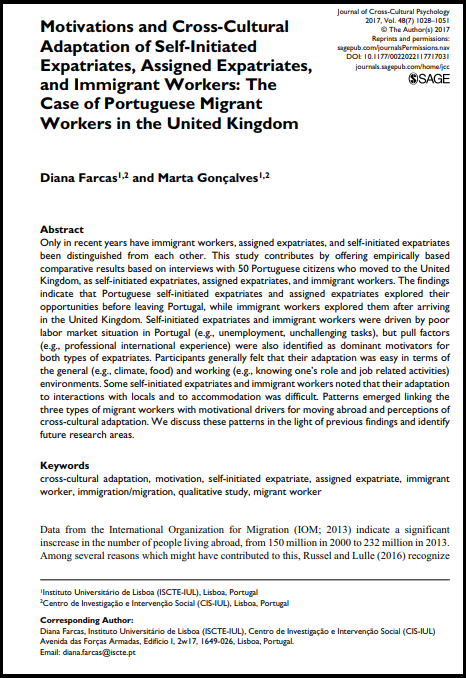 Título Motivations and cross-cultural adaptation of self-initiated expatriates, assigned expatriates, and immigrant workers: the case of Portuguese migrant workers in the United Kingdom
Título Motivations and cross-cultural adaptation of self-initiated expatriates, assigned expatriates, and immigrant workers: the case of Portuguese migrant workers in the United Kingdom
Autor Diana Farcas e Marta Gonçalves
Editor Journal of Cross-Cultural Psychology
Data 2017
Palavras-chave cross-cultural adaptation, motivation, self-initiated expatriate, assigned expatriate, immigrant worker, immigration/migration, qualitative study, migrant worker
http://journals.sagepub.com/doi/pdf/10.1177/0022022117717031
“Only in recent years have immigrant workers, assigned expatriates, and self-initiated expatriates been distinguished from each other. This study contributes by offering empirically based comparative results based on interviews with 50 Portuguese citizens who moved to the United Kingdom, as self-initiated expatriates, assigned expatriates, and immigrant workers. The findings indicate that Portuguese self-initiated expatriates and assigned expatriates explored their opportunities before leaving Portugal, while immigrant workers explored them after arriving in the United Kingdom. Self-initiated expatriates and immigrant workers were driven by poor labor market situation in Portugal (e.g., unemployment, unchallenging tasks), but pull factors (e.g., professional international experience) were also identified as dominant motivators for both types of expatriates. Participants generally felt that their adaptation was easy in terms of the general (e.g., climate, food) and working (e.g., knowing one’s role and job related activities) environments. Some self-initiated expatriates and immigrant workers noted that their adaptation to interactions with locals and to accommodation was difficult. Patterns emerged linking the three types of migrant workers with motivational drivers for moving abroad and perceptions of cross-cultural adaptation. We discuss these patterns in the light of previous findings and identify future research areas.”






